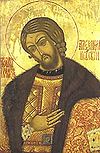- Peter Wittgenstein
-
Ludwig Adolph Peter, Prince Wittgenstein (Pyotr Khristianovich Wittgenstein) (German: Ludwig Adolph Peter Fürst zu Sayn-Wittgenstein Russian: Пётр Христиа́нович Ви́тгенштейн) (17 January (6 January) 1769, Pereiaslav – 11 June 1843, Lemberg, Austrian Empire) was a Russian Field Marshal distinguished for his services in the Napoleonic wars.
Contents
Life
Born Count Ludwig Adolf Peter of Sayn-Wittgenstein-Ludwigsburg, he was descended from a family of independent counts whose seat was in Berleburg (present day North Rhine-Westphalia, Germany).
Military career
He was promoted to Major in 1793 of the Ukrainian light cavalry regiment. He fought with the unit in the Kościuszko Uprising. Promoted Colonel in 1798, and promoted to major general 1799, in 1800 he took command of the Mariupolski Hussars Regiment.
In 1805, he fought at Austerlitz, in 1806 against the Turks, and in 1807 against Napoleon at Friedland and against the Swedes in Finland.
In the war of 1812 he commanded the right wing army of the Russian Army, which he commanded in the First and Second battle of Polotsk. It was the battle that decided fate of Saint-Petersburg. Alexander I awarded him the Order of St. George. He tried to combine with Pavel Chichagov, at the Battle of Berezina, and later combined with the Prussian army corps under Ludwig Yorck von Wartenburg.
In the campaign of 1813 in January, he took over the command of the Russian army after Kutuzov's death, and commanded the Russian army at Lützen and Bautzen. But after the defeats of the Spring campaign, he laid down this command and led an army corps during the Battle of Dresden and Battle of Leipzig.
In the campaign of 1814, he led the 6th Corps under Schwarzenberg, and he was severely wounded at Bar-sur-Aube. [1]
In 1823 he was promoted Field Marshal, and in 1828 he was appointed to command the Russian army in the war against Turkey. But ill health soon obliged him to retire. In 1834 the King of Prussia gave him the title of Fürst (Prince) zu Sayn-Wittgenstein.
Family
His parents were Count Christian Louis Casimir of Sayn-Wittgenstein-Ludwigsburg and his first wife Countess Amalie Ludowika Finck von Finckenstein.
On 27 June 1798 he married Countess Antonia Cäcilie Snarska and had in this marriage 11 children. He died on 11 June 1843 in Lemberg (Lviv), where he looked after estates of his son Lev Petrovich.
References
External links
- Kamenka, Wittgenstein's paradise
 This article incorporates text from a publication now in the public domain: Chisholm, Hugh, ed (1911). Encyclopædia Britannica (11th ed.). Cambridge University Press.
This article incorporates text from a publication now in the public domain: Chisholm, Hugh, ed (1911). Encyclopædia Britannica (11th ed.). Cambridge University Press.- "Ludwig Adolf Peter zu Sayn-Wittgenstein", German Wikipedia
- "Витгенштейн, Пётр Христианович", Russian Wikipedia
People from Russia Leaders and religious - Pre-1168
- 1168–1917
- 1922–1991
- 1991–present
- RSFSR leaders
- General secretaries
- Soviet premiers (1st deputies)
- Soviet heads of state (and their spouses)
- Prime ministers (1st deputies)
- Foreign ministers
- Prosecutors general
- Metropolitans and patriarchs
- Saints

Military and explorers - Field marshals
- Soviet marshals
- Admirals
- Aviators
- Cosmonauts
Scientists and inventors - Aerospace engineers
- Astronomers and astrophysicists
- Biologists
- Chemists
- Earth scientists
- Electrical engineers
- IT developers
- Linguists and philologists
- Mathematicians
- Naval engineers
- Physicians and psychologists
- Physicists
- Weaponry makers
Artists and writers Sportspeople - Chess players
Categories:- 1769 births
- 1843 deaths
- People from Pereiaslav-Khmelnytskyi
- Russian commanders of the Napoleonic Wars
- Field Marshals of Russia
- House of Sayn-Wittgenstein
- Members of the State Council of the Russian Empire
- Russian people of the Kościuszko Uprising
- Recipients of the Order of Saint George II Class
- Recipients of the Order of Saint George III Class
- Recipients of the Order of Saint George IV Class
- Recipients of the Order of St. Andrew
Wikimedia Foundation. 2010.

